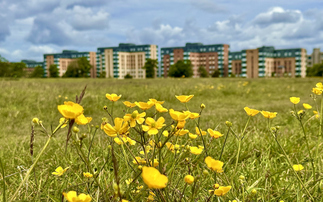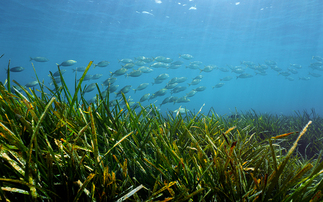Vice-president of nature and water cycle Eric Soubeiran sits down with BusinessGreen to discuss the French food giant's plans to move away from intensive farming practices in the pandemic era
Earlier this year, Danone became the first listed company to become an ‘entreprise à mission', a new type of corporation created by a 2019 French law. The pioneering governance structure will see the food giant officially entrench environmental, social, and societal objectives into its bylaws, alongside more typical profit goals.
Danone, which was founded more than a century ago and was famously declared an asset of national importance by the French government in 2005, has long prided itself on being a purpose-led business. Its new status is the latest in a string of moves the company has made to boost its environmental, social, and governance (ESG) credentials as it works towards meeting a highly-publicised aim of becoming one of the first B Corps certified multinational.
Eric Soubeiran, the company's vice-president of nature and water cycle, explains that weaning the company off intensive farming is at the core of its new sustainability mission. Danone, which owns a range of household brands including Volvic, Evian, Actimel, Alpro, and Activia, is first and foremost a dairy company, after all.
"If you really want to do sustainability well in a company, you need to know your business well," Soubeiran says. For a food company, that means knowing how and where you source your ingredients, what your customers want, and understanding the provenance of your direct and indirect carbon emissions. "Concretely, when you look at Danone, 60 per cent of our carbon footprint is from agriculture," Soubeiran acknowledges. "Eighty-nine per cent of our water footprint is from agriculture. [Sustainability] starts from knowing your Scope 3 [value chain emissions]. It is looking at the elephant in the room, and going after it piece by piece. That is why it's very important for us to have an opinion about the agriculture model we want."
As such, the company is working with farmers worldwide to adopt a regenerative approach to farming that encourages healthier soil and ecosystems, better water stewardship, and a broader diversity of cultivated seeds and crops. Danone is currently providing training to farmers in France to make the switch to new techniques to meet a goal to rely on 100 per cent regenerative farming in the country to by 2025. And in order to encourage the approach beyond its supply chain, Danone recently founded the One Planet Business for Biodiversity (OP2B) initiative, a cross-sector effort to improve the private sector's approach to biodiversity.
The strained food production system is begging for reform, argues Soubeiran. "It is very clear in Danone's vision that the food system is broken," he reflects. The practices ensconced in the 'green revolution' of the 1970s, he says, have "intensified agriculture practices to a point where we have created a situation where food has become a commodity. And by definition, a commodity has no value or very limited value. That's why [as an industry] we are focused on volume, not quality, and how we have reached a point where we accept the fact that 30 per cent of all food produced globally is wasted".
The transition away from intensive farming, he stresses, can not only prevent the loss of wild species, create better working conditions for farmers and livestock, end monocropping, and protect local ecosystems, but it is also a lever that Danone must pull if it is to reduce its carbon emissions to net zero by mid-century in line with global climate goals.
Soubeiran has experience disrupting what he dubs 'linearalised' food chains and moulding them to be more sustainable. In a previous role at Danone, he was charged with managing the company's milk supply during the period when France liberalised its previously tightly-controlled milk market. The company decided to eschew a price mechanism focused on volume and set its milk price based on the cost of production, giving Danone leeway to firm up production conditions with farmers. "We wanted to stabilise our relationship with farmers so that we could discuss the way they were farming, talk about sustainability and animal welfare," Soubeiran explains. "It's hard to do that when you have huge [price] volatility."
Indeed, Soubeiran is under no illusions that the wholesale transition to regenerative farming comes at a cost premium, despite growing interest in sustainable products from customers across Danone's markets. "There is a market for sustainable food - people look for it - but we need to develop parallel stream of financing," he says. "That's why Danone has signed the green recovery appeal at the European level, because we believe the transformation and the renegotiation of the agriculture policy is instrumental to that."
An additional stream of financing is targeted at helping farmers improve the quality of what they are producing while keeping prices down for the customer, Soubeiran explains.
As such, in May the company urged the EU to use its upcoming Farm to Fork and Biodiversity 2030 strategies to establish an EU Common Food Policy that provides incentives to farmers to switch to regenerative practices. These, the company suggested, could range from crop and livestock insurance that minimises the risk of lower yields through the transition process; 'innovative multi-stakeholder financing mechanisms' or carbon bonds for agricultural products with pricing adjusted to reflect soil carbon sequestration performance; and guarantees of 'first loss' inspired by the renewable energy sector that would allow farmers to fund the transition to more resilient agricultural systems.
Soubeiran contends that the coronavirus has, in some respects, made his mission easier, given that the animal-originating coronavirus has underscored how ecological systems support human life. "If we protect biodiversity, we are basically protecting the diversity of DNA," Soubeiran muses. "There's also a sanitary aspect to it, given that we're protecting corridors of biodiversity. While that was not that obvious six months ago, that's obvious now for everyone." More than 65 per cent of all emerging infectious diseases in humans are zoonotic - transmitted to people from animals - he points out.
But, while the zoonotic coronavirus has turbocharged public understanding of biodiversity and served as a "call to action" for Danone's corporate sustainability initiatives, Soubeiran concedes that on a practical level the pandemic has hampered the firm's ongoing efforts to transition farmers to regenerative practices. For example, when social distancing regulations were at their most demanding, trips to train farmers on new practices and discuss investment and financing plans became logistically impossible.
On the bright side, however, the crisis has underlined the resilience of Danone's direct sourcing model, he says, which minimised supply chain disruptions caused by the pandemic. The firm sources 75 per cent of products directly from suppliers, Soubeiran explains, adding that the model is a major boon in a world where collaborations and knowledge-sharing between multinationals and their suppliers are critical to meeting carbon targets and other joint sustainability objectives.
Soubeiran contends that there is a healthy appetite from company shareholders for Danone's growing file of sustainability initiatives, in particular its decision at the close of last year to publish carbon-adjusted earnings per share (carbon EPS) in its quarterly reports. The metric sends a very strong message to shareholders that the company "has done its homework" on counting its Scope 1, Scope 2 and Scope 3 emissions, according to Soubeiran, as well as exposing them to the invisible cost of carbon. Danone, banking on the assumption it reached peak emissions in 2019, is confident that its carbon-adjusted EPS will rise over the years to come. And investors are engaging with the approach - in 2018, Soubeiran estimates he had 70 interactions with shareholders; last year, it had more than doubled to 190.
Moreover, in late June, 99 per cent of shareholders backed Danone's motion to become an 'entreprise à mission', a turnout dubbed "mind-blowing" by Danone chief executive Emmanuel Faber. "Huge kudos to our shareholders after today's unanimous support of the change of Danone's by-laws to incorporate health, planet, people and inclusiveness objectives as part of our mission," Faber enthused. "You showed evidence that finance can change the world. It is on us, boards and CEOs, CFOs to engage finance on what matters. It responds. Big time."
Over the coming months, Soubeiran will be focused on steering a cross-sector effort to improve the private sector's approach to biodiversity, dubbed the One Planet Business for Biodiversity (OP2B) initiative.
The coalition, which was launched by Danone at last year's UN COP climate conference, counts consumer goods heavyweights l'Oréal, Google, McCain, Walmart, Kellogg, Nestlé, and Unilever. The companies have promised to work together to scale up regenerative agriculture practices, to increase the number of ingredients sourced in order to reduce the world's reliance on a handful of crops, and to better protect local ecosystems through nature restoration and eliminating deforestation. The group is currently developing a framework for action that will be unveiled at the IUCN World Conservation Congress, which was postponed six months to January 2021 in the wake of the pandemic.
The initiative has been inspired by "systems thinking" Soubeiran explains, and will focus on specific actions that can be monitored instead of overarching science-based targets or percentage-based goals. "With OP2B the focus is on action, action that can trigger a transformation," he says, adding that that the single-issue, action-orientated initiative is "quite a new way of collaborating" for Danone.
Overall, Soubeiran is buoyed by the boundless opportunities' biodiversity boosting initiatives present to food companies looking to enrich their portfolios - a fact underlined by this week's World Economic Forum study highlighting how a nature-focused recovery could deliver over $10tr of economic gains. "Very often, sustainability is seen as a constraint - about less carbon, less pesticide, less fertiliser," Soubeiran reflects. "But biodiversity is about more: More choice, more taste, more experience. It's a very interesting topic and creates a positive spin on sustainability."
The Net Zero Leadership Hub is brought to you in partnership with BT, as part of its support for the Net Zero Leadership Stream at the world's first Net Zero Festival this autumn.
All the content on the Hub is fully editorially independent unless otherwise stated. You can find out more about the Net Zero Festival and reserve your place here.









